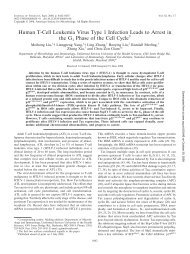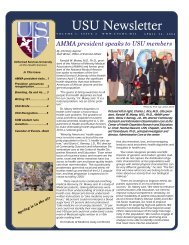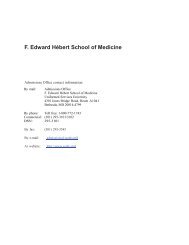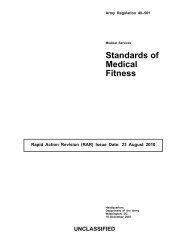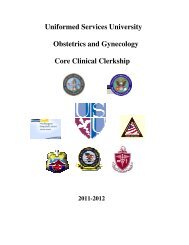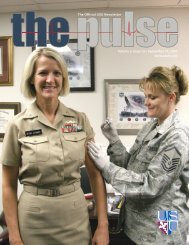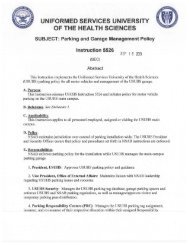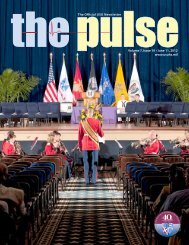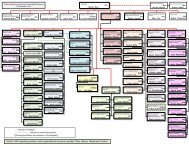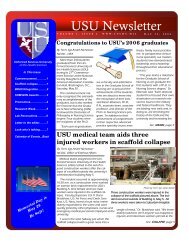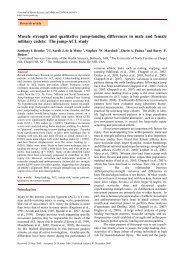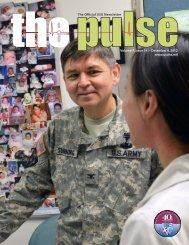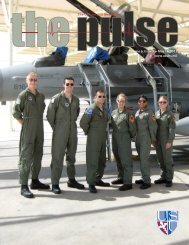Annual Report - Uniformed Services University of the Health Sciences
Annual Report - Uniformed Services University of the Health Sciences
Annual Report - Uniformed Services University of the Health Sciences
You also want an ePaper? Increase the reach of your titles
YUMPU automatically turns print PDFs into web optimized ePapers that Google loves.
CourageCenter for Disaster and Humanitarian ResponseThe U.S. military is increasingly called on to supportdomestic and international disaster response ando<strong>the</strong>r humanitarian assistance efforts, which <strong>of</strong>teninvolves providing medical care in austere environmentsand in developing countries. The Center forDisaster and Humanitarian Assistance Medicine(CDHAM), which operates within USU’s Department<strong>of</strong> Military and Emergency Medicine, serves as acentral resource for <strong>the</strong> DoD, o<strong>the</strong>r government agenciesand international partners.Headed by Robert Darling, M.D., a graduate <strong>of</strong> <strong>the</strong>USU class <strong>of</strong> 1985, CDHAM’s staff has expertisein a broad range <strong>of</strong> areas, and its academic settingenables a multidisciplinary approach to disastermitigation. The program is engaged in a full range<strong>of</strong> initiatives aimed at improving preparedness andresponse. Many <strong>of</strong> <strong>the</strong>se efforts are undertaken withforeign military and civilian agencies, as well as o<strong>the</strong>rleading U.S. academic medical centers.The center supports <strong>the</strong> U.S. military with a widerange <strong>of</strong> health-related activities around <strong>the</strong> world.CDHAM works with <strong>the</strong> Global Emerging InfectionsSurveillance and Response System (DoD-GEIS)on a pandemic influenza program, serving as aresource for commanders in <strong>the</strong> field. The center iscollaborating with <strong>the</strong> U.S. Sou<strong>the</strong>rn Command tocreate a sustainable HIV/AIDS prevention programfor Caribbean defense forces in seven countries.Staff members also are working with <strong>the</strong> government<strong>of</strong> Chad on a landmine assistance program to helpgovernment and military forces provide care to victims<strong>of</strong> landmines.In May <strong>of</strong> 2007, two researchers with CDHAMpublished a study showing that many residents <strong>of</strong>FEMA-created trailer parks housing persons displacedby Hurricane Katrina are facing serious and persistentmental health issues. According to <strong>the</strong> study, whichappeared in <strong>the</strong> Annals <strong>of</strong> Emergency Medicine,major depression is a pervasive problem, with suicideattempts among trailer park residents at a rate 78times higher than <strong>the</strong> national average. The researchers,Lynn Lawry, M.D. and Michael P. Anastario, Ph.D.,used a global humanitarian aid perspective to assessa number <strong>of</strong> factors, including mental health, for <strong>the</strong>purpose <strong>of</strong> informing recovery efforts.In 2007, a CDHAM team traveled to Afghanistan tohelp coordinate efforts to devise strategies to createa long-term health care infrastructure by helping torebuild <strong>the</strong> civilian medical system and expandinghealth care expertise within <strong>the</strong> country. Efforts includeworking with Afghan National Security Forces tohelp <strong>the</strong>m develop <strong>the</strong>ir health care infrastructure andconduct health care training programs.The Center’s staff has expertise in abroad range <strong>of</strong> areas, and its academicsetting enables a multidisciplinaryapproach to disaster mitigation.Jim Holliman, M.D., was part <strong>of</strong> a CDHAMteam that travelled to Afghanistan.30



